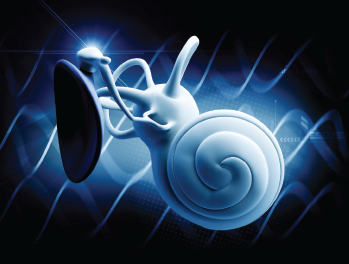
© Liya Graphics / shutterstock.com
The field of autoimmunity is evolving to include a whole new set of conditions called autoinflammatory diseases, some of which include sensorineural deafness among their symptoms, according to new research by Andrea Vambutas, MD, chair of otolaryngology at Long Island Jewish Medical Center and North Shore University Medical Center in New York.
Explore This Issue
November 2019Dr. Vambutas, an active clinician and professor of otolaryngology and molecular medicine at the Zucker School of Medicine at Hofstra/Northwell, is also an investigator in the Center for Autoimmune, Musculoskeletal, and Hematopoietic Diseases at the Feinstein Institutes for Medical Research. She delivered the Howard P. House Memorial Lecture for Advances in Otology on September 17, 2019 at the American Academy of Otolaryngology–Head and Neck Surgery Annual Meeting on key biologic and clinical features that distinguish autoimmune from autoinflammatory disease and covered new treatment possibilities in the pipeline for sensorineural deafness.
Autoimmune and allergic disorders are on the rise. According to Dr. Vambutas’ presentation, these include more than 80 distinct diseases and affect 14 to 23 million people. When it comes to immune-mediated hearing loss—for example, in the case of Meniére’s disease, sudden sensorineural hearing loss (SSNHL), or autoimmune inner ear disease (AIED) —the challenge clinicians face is that there is no specific diagnostic biologic marker to show the severity of disease, how it should be treated, or for how long.
Autoimmune or Autoinflammatory?
Understanding autoimmune and autoinflammatory disease requires knowing the difference between the innate and the adaptive immune response. According to the presentation, when the innate immune system works, the macrophages come in first and present antigen to the adaptive immune response. Autoinflammatory disease occurs when the innate immune response isn’t working. Autoimmune disease occurs when the adaptive immune response isn’t working.
The triggers for these rare diseases are largely unknown but may include genetic predisposition, allergy, or even acoustic trauma. Although autoinflammatory diseases are genetic, no genetic marker for AIED has been identified, and patients do not typically have afflicted relatives. The clinical treatment history for patients with these conditions has been limited to prednisone; methotrexate and TNF antagonists have limited efficacy. Of the 60% of patients who initially respond to steroid treatment, only 14% remain responsive after 34 months, and those patients are at risk for side effects that can range from osteoporosis to psychosis. Steroid-resistant patients have been limited to rehabilitative strategies such as hearing aids and cochlear implants, because no medical therapy has been shown to be effective.